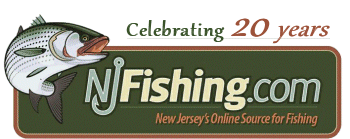Quote:
Originally Posted by Broad Bill

Hammer I'm not wrong on any points and if you're too busy to waste effort on this I have a solution, stop posting misinformation. I don't care who you spoke with, I have my sources too and I've shared the regulation on this thread. Maryland has a saltwater license and gets the same amount New Jersey does. Licenses represent just 60% of the allocation formula. How many licenses would be generated by a New Jersey which is key to the allocation no one seems to really have a firm handle on. Without that knowledge, you and which ever Director you spoke with can't make that claim. I know funds we get now are from hunting and freshwater sales, I've said that all along.
What states require a saltwater license if fishing on a for hire boat? Please provide the names of those states. And yes there are exceptions. Florida, which you brought into the discussion, doesn't require anglers on for hire to purchase a license as long as the boat has the proper blanket permit which every operator would be crazy not to. Neither does North Carolina. Just check out the attached link and stop posting misinformation otherwise you'd have more time on your hands and so would I.
https://www.google.com/search?q=does...hrome&ie=UTF-8
That sounds like an exception wouldn't you agree, feel free to send it to the Director you spoke with.
Here's North Carolina's regulations which you can send as well. If a for hire vessel has a blanket license, anglers on board do not need what ND refers to as a Coastal Recreational Fishing License or "CRFL".
https://www.deq.nc.gov/marine-fisher...table/download
And like I said, if NJ introduced a salt water license and made it mandatory for patrons of charter/party boats to purchase one, in my opinion as I've said all along the state would be putting another nail in the coffin of the for hire fishing community. |
The Sport Fish Restoration and Boating Trust Fund is funded in part by the federal excise tax on fishing equipment and is the backbone of state-based fish conservation, benefiting all U.S. states and territories. The Wildlife Restoration Program, funded by the federal excise tax on guns, ammunition, and archery sales, provides grant funds to states and insular areas’ fish and wildlife agencies for projects to restore, conserve, manage and enhance wild birds and mammals and their habitats. Projects include providing public use and access to wildlife resources, hunter education and development and management of shooting ranges.
“Many Americans are unaware of the remarkable conservation impact of the Wildlife and Sport Fish Restoration Program,” said Fish and Wildlife Service Principal Deputy Director Martha Williams. “State wildlife agencies dedicate WSFR funds to a variety of conservation projects and programs such as hunting and fishing education, fish and wildlife management, scientific research, habitat restoration and protection, land and water rights acquisition, and hunting and boating access. Everyone benefits from these investments, which have ensured a legacy of wildlife and outdoor opportunities for all.”
Congress authorizes the WSFR disbursements through the Pittman-Robertson Federal Aid in Wildlife Restoration Act and Dingell-Johnson/Wallop-Breaux Federal Aid in Sport Fish Restoration Act. To date, the Service has distributed more than $25.5 billion in apportionments for state conservation and recreation projects. The recipient state wildlife agencies have matched these funds with approximately $8.5 billion throughout the years, primarily through hunting and fishing license revenues.
Eligible states receive WSFR funds through formula-based permanent appropriations. The distribution formulas are based primarily on land and water area and the number of paid recreational hunting and fishing license holders in each state. State fish and wildlife agencies make their own management decisions about how the funds are used. The WSFR dollars typically fund up to 75% of project costs. Most states must provide a matching share of up to 25%, usually from state hunting and fishing license revenues.
State-by-state listing of the Service’s final apportionment of Wildlife and Sport Fish Restoration program funds for Fiscal Year 2022 can be found on the WSFR webpage.










